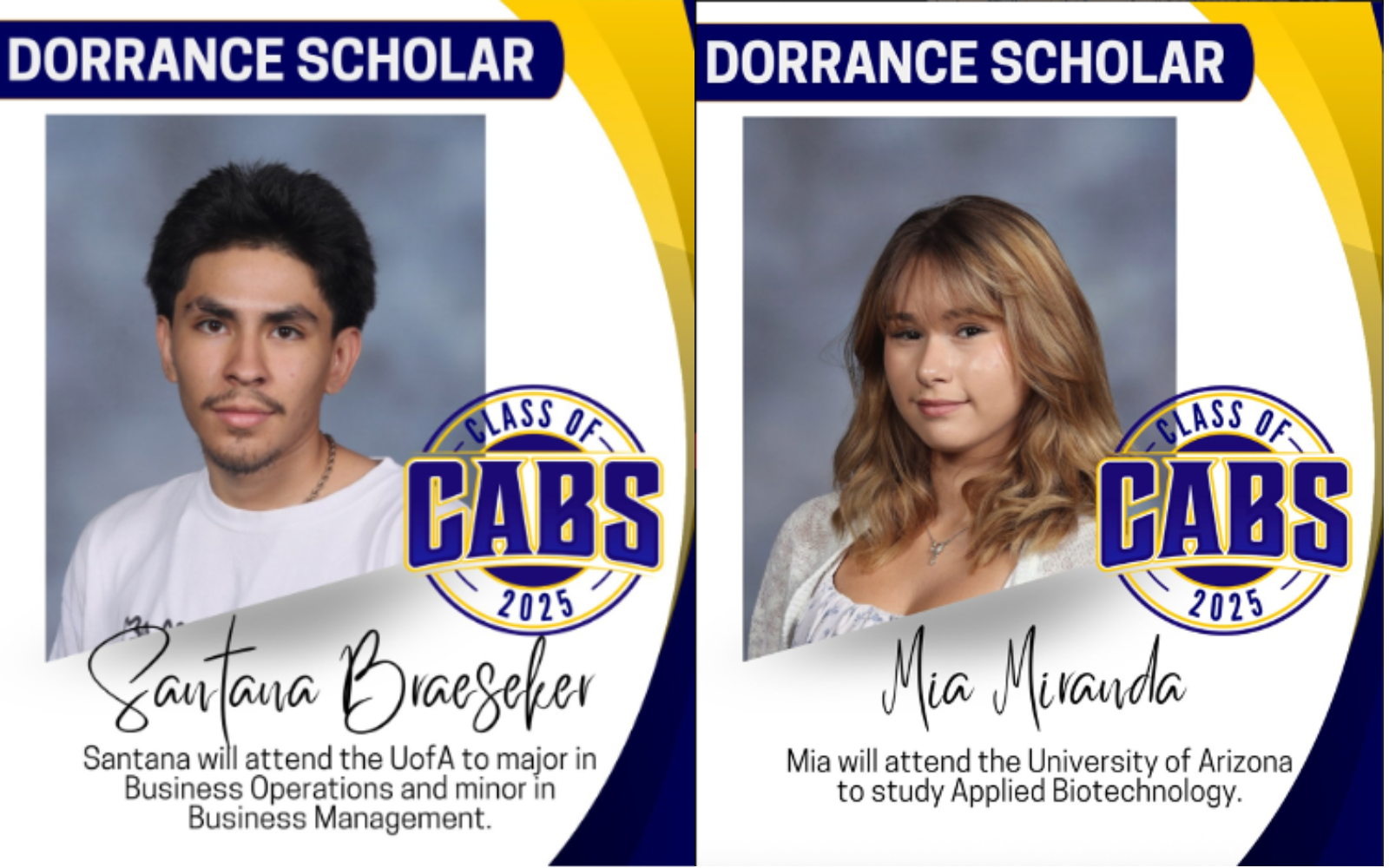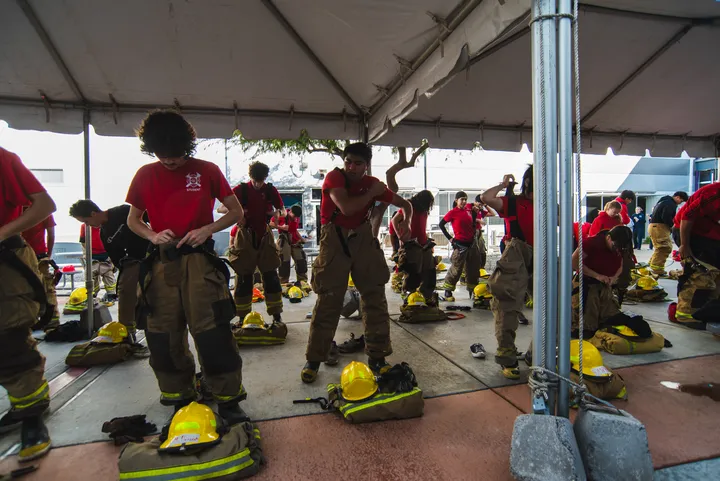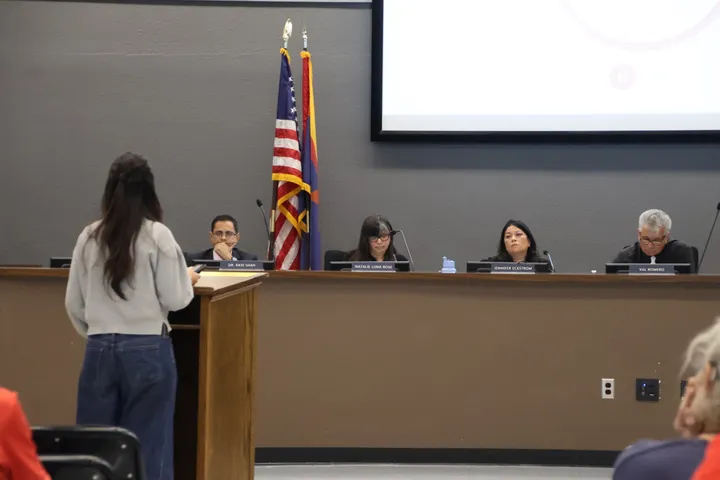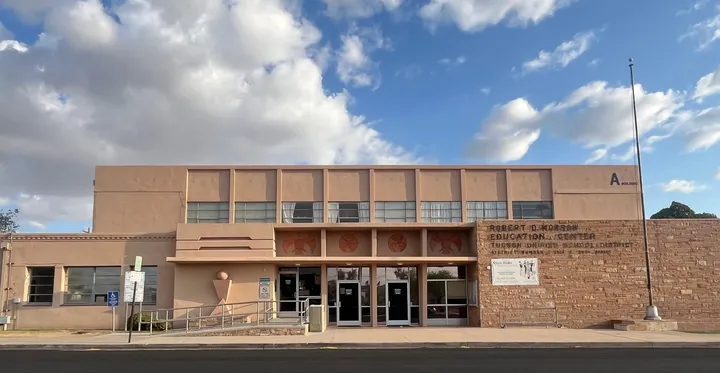Flowing Wells seniors chart paths beyond high school
Flowing Wells High School in Tucson is transforming graduation into a launchpad for college and careers through its 100% Initiative, which supports every student from freshman year to post-secondary success.

At Flowing Wells High School, graduation isn’t the finish line, it’s a launchpad. This spring, 363 seniors crossed the stage in a small westside Tucson district where most come from low-income households and many will be the first in their families to pursue higher education, leaving not just with diplomas, but with direction.
Backed by a school-wide commitment known as the 100% Initiative, Flowing Wells is charting a new path: one where every student, regardless of background, is equipped to chase college, careers, and a future of their own making.
Flowing Wells, which covers 13 square miles west of Interstate 10, has one traditional high school, an alternative high school, one junior high and six elementary schools.
But despite its small size, more than 90% of the district’s senior class graduates every year, a higher rate than many other Tucson districts. What they don’t have in size they make up for in aspiration, goals and success.
This year, 170 Flowing Wells seniors were admitted to the University of Arizona and another 50 into Arizona State University. Many were also accepted in out-of-state colleges.
“Every student who walks through our doors deserves a chance to make a decision for themselves about the kind of person they want to be and how they want to spend their time as adults,” said Flowing Wells High School Principal Frank Thomas. “For many of our families, having that ability starts with pursuing a program after you get your diploma here.”
Flowing Wells High School achieves its high graduation and college placement rates thanks to a program called the 100% Initiative, which supports students in every step on their journey to higher education, starting during their freshman year. Its mission is to have 100% of the school’s graduating seniors involved in post-secondary education or training.
During their freshman year, students develop a career action plan with their college and career counselor. The plan is updated and adjusted throughout their high school career and by senior year, students have a more solid roadmap for their post-graduation plans, whether that be college, trade school or moving directly into the workforce.
“The 100% initiative is inclusive in the way that we're not saying you have to go to college and college is the only option,” said College and Career Counselor Stacey Grijalva. “It's saying that we are here to support your goals and your dreams, whichever pathway that may be.”
Flowing Wells offers a diverse range of learning opportunities to students when it comes to career and technical education, including agricultural science, automotive technologies, biology, culinary arts, digital photography, engineering, education, fashion design, film and stagecraft. These specialty classes equip students with the knowledge and skills needed to enter these fields of work.
Flowing Wells High School opened a community learning center in 2023, adjacent to the high school. It includes a preschool facility where high school students can get hands-on experience working with kids. The high school also has a fully functioning mechanic shop where students can work on cars.
“The 100% initiative is our commitment to our students and our families that once a student graduates from here, they go on to bigger and better things,” Thomas said. “They're not working at a job that's like a minimum wage, entry-level job that they're going to work at for the rest of their life. That they're involved in some sort of program or a training that is going to lead to them pursuing high achieving jobs that could be college, it could be the military, it could be a trade school or something like that.”
Counselors meet with each student one-on-one for an in-depth interview about their goals, vision for their futures and any barriers that may get in the way of those goals. From there, they begin to plan.
That plan is key at Flowing Wells, a Title I school where over 70% of students come from a Hispanic background, and less than 20% of students achieve English Language proficiency, according to the Arizona Department of Education. Many students are first-generation Americans and will be the first in their family to get a higher education.
“We can tell it to them, and we can tell it to them over and over, but if they don't believe it because they don't see it, then none of that matters,” Thomas said. “We have to make (students) believe that they can do that.”
More than 60% of Flowing Wells’ families meet the federal guidelines of free and reduced lunch, which is available to families at or below 130% of the poverty level. The level for a family of four is $32,150.
“We have many students and many families that money is a big struggle for. We have a lot of students who live in houses with another family. We have many students who are homeless and live by themselves, or are couch surfing or live with friends,” Thomas said. “For the vast majority of our families, resources tend to be a problem and not something that's accessible to them in the ways that they need it, and they rely on us as a school to close those gaps.”
President Donald Trump recently unveiled their proposed budget that would reduce the U.S. Department of Education’s budget by 15% from $79.6 billion to $66.7 billion. Roughly half of the proposed cuts affect programs for K-12 schools, though Title I funding will stay at relatively similar funding levels as in previous years. The budget comes at the heels of a federal judge blocking Trump’s executive order to close the Department of Education.
Despite the chaos at the national level, Flowing Wells continues in its mission to protect and advance student’s educations.
“Everything affects students' chances to make it, right?” Thomas said. “When you're talking about students who are coming from the backgrounds our students are coming from, it doesn't have to be some big political initiative that can be the difference between them going to college or not. It can be a flat tire that they cannot fix and thus cannot go to class for two weeks, and then they're done.”
And with Arizona ranking last in the nation for public education in 2025, there isn’t much statewide funding or support for them to succeed.
“When we look at the statistics of students of color… we understand that our country hasn't been the kindest, and there have been a lot of barriers to breaking cycles for minority populations,” Grijalva said. “This 100% initiative creates this culture that makes sure that educators are making it a priority to make sure these students have opportunities, whatever that may look like.”
The school offers opportunities to tour colleges all over the state, funneling students into programs that help them see themselves as professionals and academics, and holding information sessions on topics including applying to college and for financial aid.
Recent Flowing Wells graduate Santana Braesker is an example of how the 100% Initiative plays out in real life.
With plans to attend the UA and major in business operations or law, Braeseker will be the first in his family to go to college. His mom graduated from high school and his dad dropped out.
For his family, this is a “big milestone,” he said.
And while his parents support him by motivating him to go to school, Braeseker said they can’t really support him when it comes to the college process, since they themselves don’t have an idea of how it works. That’s where Flowing Wells comes in.
“A high school diploma lets you get jobs that other people want to give you,” Thomas said. “We care to make sure that students have opportunities to be who they want to be and to think through those things, even if they don't believe that those options are accessible to them, it's our job to make them accessible to them. We have to show them that it's a possibility for them.”
They do this by being a pillar of support for their students, encouraging them and validating their experiences, Thomas said.
“The biggest help is definitely my school counselors, because when I'm struggling with something with college, all my counselors always have my back, Mr. Thomas has my back, they're just always there to support me,” Braeseker said. “No matter what challenge that I faced in life or despite my attendance, despite my grades, like they were always here to support anybody, regardless of who you are and what you've done.”
Braeseker struggled with health problems his sophomore year, eventually being diagnosed with a stomach disease that disrupted his normal routine and affected his schooling.
“Some mornings it's really bad, it's almost like you can't move,” he said.
Despite his struggles, he’s made an effort to set a schedule that helps him overcome the pain. And with the help of his counselors, he’s chased after life-changing scholarship opportunities.

He is a recipient of the Dorrance Scholarship, a need-based award that includes a $12,000 scholarship per academic year for four years, a summer bridge experience to prepare him for college academics, and international travel and cultural enrichment events.
“I'm learning who I am, what I'm going to contribute to society and what I'm going to do for my family and my future family and just everything that life has to bring,” Braeseker said. “I'm ready to tackle it head on.”
Mia Miranda is another graduating senior going to the UA. She’s participating in New Start, a summer program that prepares students for university life, and she is also a recipient of the Dorrance Scholarship.
Three Flowing Wells students were awarded that scholarship, a record for the school.
Miranda is from the Cocopah Tribe in Yuma, moving to Tucson in first grade and jumping from charter school to charter school before spending the last four years at Flowing Wells. She lives independently and has a job, but has made sure to stay involved academically.
Miranda dreams of a career in applied biotech, something that has been fueled by her high school experience.
She took an introductory class in biotech her junior year and continued into advanced biotech her senior year. Through the class, she’s had the opportunity to visit the UA for a field trip to view their labs
“It's not a typical field trip that you get to do, it's pretty difficult to see the labs at the UA,” Miranda said. “We saw the demo lab and the researchers there just showed us all their current research and materials that they have, like seeing a $100,000 microscope up close was insane. And this was just an experience that I wouldn't be able to have without (the 100% Initiative.)”
Miranda’s bioscience program at Flowing Wells was a rigorous curriculum that prepares students for higher education and careers in biotechnology fields. A dual enrollment credit is even available for a class at the UA, with dual enrollment allowing high school students to take college-level classes for credit.
In ten years, Miranda sees herself working on a ship doing field research on oil spills. It was a focus of one of her research projects and she wants to continue that work in her higher education.
“I don't see myself being very complacent,” she said. “I see myself everywhere. And in ten years, hopefully I have a PhD. Hopefully I'm on the field and in the ocean looking at oil spills. That's where I dream to be.”
Susan Barnett is Deputy Editor of Tucson Spotlight and a University of Arizona alum. Contact her at susan@tucsonspotlight.org.
Tucson Spotlight is a community-based newsroom that provides paid opportunities for students and rising journalists in Southern Arizona. Please consider supporting our work with a tax-deductible donation.



